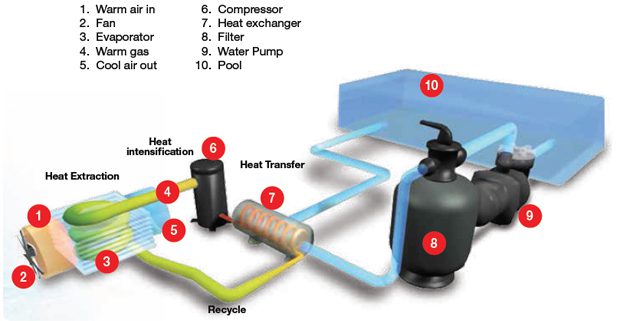Using Heating and Cooling System to optimise pool temperature
We redefine your swimming pool experience with our advanced Heating and Cooling System, including state-of-the-art heat pump. Our heat pump technology ensures optimal Pool Water Temperature Balance, allowing you to enjoy your pool in comfort, whether it’s a warm swim on a cool evening or a refreshing dip in the heat of summer. Experience the perfect harmony of our Pool Heater and Pool Cooler functionalities.
The water temperature in swimming pools is a very important and delicate parameter to control. Pool Heating and Cooling System help set the water at the desired temperature by heat pump, controlling it and managing it in the direction required. Depending on the type of pool, the surroundings, its frequent users, and many other factors, it is important to know which types of systems to use and their advantages. Your pool’s ideal temperature can be maintained by using high-performance heat pump and coolers, thermal pool covers, and/or water features like waterfalls and fountains. There are many benefits: pumps save a lot of energy, and all these systems keep water and temperature from escaping, which cuts down on usage even more. Also, they can greatly extend the swimming season for outdoor pools and are durable and simple to incorporate into an existing structure at Bangladesh Swimming Pool.
Which kinds of pool heating and cooling systems are ideal for your swimming pool? Pool water can be heated and cooled in a variety of ways, from heat pumps to more creative and beautiful options like water fountains or pool covers:
In this article we’ll cover:
- The importance of optimal management of pool water temperature;
- Cooling and heating solutions for your pool;
- Additional tips for keeping your pool at the right temperature.
Water pool temperature: Why heat pump important?
The temperature of the water pool heater and pool cooler in any aquatic facility is a critical determinant of user comfort and affects how much fun guests have in your pool. Furthermore, since there won’t be as much variance in temperature to compensate for, your pool systems will operate more efficiently the better maintained they are. Ultimately, keeping your pool at the proper temperature has an impact on its hygiene, which is crucial for everyone’s health and safety.
What affects the pool water temperature (Pool Heater and Pool Cooler)?
Of course, there are many factors that influence the temperature of pool water. Some to take into account are:
Location and atmospheric temperature: Warmer climates require more frequent cooling of pools, and vice versa. Water heats up quickly, especially in the summer when temperatures consistently reach over 30 degrees Celsius and the pool is exposed to direct sunlight.
Evaporation: Evaporation is a result of temperature imbalances. Water constantly evaporates, lowering its volume and, consequently, temperature, especially in hot and humid climates. The water’s temperature drops as it evaporates because the bonds holding its molecules together are broken. Another factor contributing to heat loss is the temperature differential between water and air.
New water supplies: The volume of water in your pool will increase as a result of evaporation, which will lower the temperature and necessitate heating or cooling the pool. More water is splashed around and evaporated from the pool’s volume as more swimmers enter and move around in it. This ultimately results in the need to top off the water, which lowers the pool’s temperature once more.
Usage: More water is splashed around and evaporated from the pool’s volume as more swimmers enter and move around in it. This ultimately results in the need to top off the water, which lowers the pool’s temperature once more. Our heat pump technology ensures optimal Pool Water Temperature Balance, allowing you to enjoy your pool in comfort





